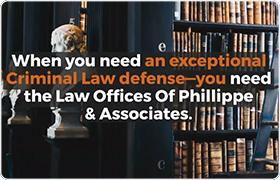Port Isabel RICO Act Lawyer, Texas
Sponsored Law Firm
-
 x
x

Click For More Info:
-
The Law Office Christopher Phillippe
104 North Express Way Brownsville, TX 78521» view mapCriminal Defense Law Helping Those Facing Difficult Times
We are confident in our ability to resolve difficult legal issues, and we will use our years of experience to represent your best interests.
800-659-6781
Not enough matches for Port Isabel RICO Act lawyer.
Below are all Port Isabel Criminal lawyers.
Christopher Lee Phillippe
✓ VERIFIED *Status is reviewed annually. For latest information visit hereDivorce & Family Law, Bankruptcy & Debt, Estate, Criminal, Accident & Injury
Mr. Phillippe has been licensed to practice law in the state of Texas since 1983. He helps his clients with Family Law, Accident & Injury, Criminal, B... (more)
Albert Lee Rodriguez III
Criminal, Divorce & Family Law, Medical Products & Devices, Divorce
Status: In Good Standing *Status is reviewed annually. For latest information visit here
FREE CONSULTATION
CONTACTJose M Gonzalez
Personal Injury, Family Law, Criminal, Immigration, Employment
Status: In Good Standing *Status is reviewed annually. For latest information visit here
Caroline Speekman Heindel
Landlord-Tenant, Criminal
Status: In Good Standing *Status is reviewed annually. For latest information visit here Licensed: 28 Years
Peter C. Gilman
Criminal
Status: In Good Standing *Status is reviewed annually. For latest information visit here Licensed: 53 Years
Charles Lewis
Criminal
Status: In Good Standing *Status is reviewed annually. For latest information visit here Licensed: 52 Years
Edward A. Stapleton
Civil Rights, Criminal, White Collar Crime, State Appellate Practice, DUI-DWI
Status: In Good Standing *Status is reviewed annually. For latest information visit here Licensed: 50 Years
Timoteo E. Gomez
Criminal
Gilberto Hinojosa
Personal Injury, Administrative Law, Criminal, Employee Rights, Administrative Law
Status: In Good Standing *Status is reviewed annually. For latest information visit here Licensed: 47 Years
Alfredo Padilla
Administrative Law, Criminal, State Appellate Practice, Contract
Status: In Good Standing *Status is reviewed annually. For latest information visit here Licensed: 47 Years
 Christopher Phillippe Brownsville, TX
Christopher Phillippe Brownsville, TX Practice AreasExpertise
Practice AreasExpertise
